A pretty penny?
Simon Cross
The collapse of the News Of The World, the Sunday tabloid which disgraced itself through phone hacking and other misdemeanours, was welcome news to many Christians, but possibly not the Church of England, who had millions invested in its parent company News Corp. This week they they made the decision - on the advice of their ethical advisors - to rid themselves of their News Corp shares. And as the scale of general financial wrongdoing becomes more and more evident, what can we do to ensure that our own approach to handling money is beyond reproach?

For years the scandal sheets of the NOTW had provided a weekly dose of the seven deadly sins, on a day when many of us would prefer to find our friends in the pews, rather than the newsagent.
But while the demise of the Murdoch owned paper was generally welcomed, it posed problems for the established Church.
The millions of pounds in News Corp shares that formed part of the Church’s investment portfolio were going to take a hit.
When taken along with the estimated £3.5 Million worth of shares in BskyB, also partly Murdoch owned, the C of E had a sizeable chunk of money invested in the at times murky world of the Murdoch empire.
To their credit, the ethical investment advisory group who help to ensure that money is being used well by Church commissioners, had played a key part in calling on Rupert Murdoch to call executives to account for ‘mismanagement’ at News Corp. And now, following the reccomendations of the group, the church has chosen to rid itself of its News Corp holdings, once and for all.
But that doesn’t necessarily answer the question of whether it was ok for them to have such a sizable investment there in the first place.
In all, it's understood that the Church of England has an investment portfolio of about £5.3 Billion pounds, a figure which is roughly equivalent to the annual GDP of four or five of the world’s poorest countries combined.
Of course, a significant portion of this is taken up with property, but billions remain to invest in company shares, with the profits used to support the Church’s work across the country.
They are not alone in this – even the Methodists, with their historic antipathy towards gambolling invest their money in the risky world of big business, including the broadcaster B Sky B.
And across the country – indeed across the world, Churches and individual Christians are investing their money with a range of financial institutions, often unaware of precisely where that money is being spent on.
According to the charity War on Want, in 2008 the big banks (Barclays, HSBC, RBS and Lloyds) held a combined £9bn worth of shares in the Arms trade, funding companies which make cluster bombs and other devices which kill and maim.
Other investment areas of dubious ethical status include environmental exploitation, nuclear power, animal welfare, and even companies which ‘employ’ slave labourers.
Added to that, the ‘bonus culture’, tax avoidance schemes, and mis-selling scandals combine to paint a none too rosy picture of conventional financial institutions.
The flip side of course, is that it is these investments which are paying for many of our pensions, and bringing in (where applicable) a return on our savings. Arguably without them, we wouldn’t be able to live the way we do, or give in the same way we can. The same high returns on investment aren’t usually generated by the kind of socially responsible investments preferred by banks like the Co-operative, Triodos and others.
Jon Cobb of Trinity Wealth Management, a Christian financial advisor, explained how his company deals with this difficult subject.
He said: "Certainly Trinity apply biblical principles to the advice they give with regards to Financial Planning, and also to investment principles such as diversification (look at Ecclesiastes 11, 1-2). But I feel that it is more important that we firstly challenge the investor with regards to his or her own attitude to money before being concerned about ethical investments.
"Firstly, it is vital that we understand that God owns it all, and I believe that many Christians do not have a testimony of this, perhaps buying God off with tithes, but not giving him ownership of the residual.
"God’s economy is perfect, it’s just that we are not! It’s important that each of us prayerfully consider what our God given goals are, prioritise them and then construct a financial plan as to how we are going to achieve these goals. What we have left over will be able to be given away which increases Kingdom impact!
"That isn’t to say that it isn’t important to consider where are monies are invested, but I have little confidence that buying shares traded on the secondary market will make much of a difference. And this is effectively what ethical funds do."
A relatively recent addition to the financial ‘scene’ in the UK, has been the growth of Islamic finance institutions, which operate according to strict religious rules. These institutions specifically bar investment in anything which contravenes Islamic principles – do they have any experience we can draw upon?
Samir Alamad, Senior Manager, Sharia Compliance & Product Development, Islamic Bank of Britain PLC explained how the Islamic system works.
He said: "Islamic banking operates without interest, which is not permitted in Islam, as money in itself is not considered to have intrinsic value. As interest is income generated from lending money, it is seen as effortless return. Instead money must be used in a productive way and wealth can only be generated through legitimate trade and investment, which involves an element of risk.
"Islamic banking uses various approaches which follow Islamic finance principles, such as Ijara, which means leasing, Musharaka which means partnership, and Wakala which means agency agreement. Islamic banks use these principles to develop Sharia compliant financial products, such as savings accounts and home finance, which allow Muslims to conduct their finances in an Islamic, ethical way.
"The source of the Islamic bank’s funding, profits and business investments cannot be in or from businesses that are considered unlawful under Sharia. That would include companies that deal in interest, gambling, pornography, speculation, tobacco and other commodities contrary to Islamic values."
So what do you think? Is this all a fuss about nothing, or do the Muslims have it right? Should we need to ditch high street banks in favour of overtly ethical finance, or should we just put pressure on the mainstream banks to change their ways? Have your say in the comments section, or on Facebook.
Latest Blogs
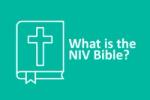
Bible
What is the New International Version (NIV) Bible?
Finding the right Bible isn’t easy. There are dozens of translations and hundreds of editions to choose from. Our new series of guides is here to answer your questions about the different Bibles on offer today.
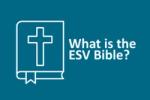
Bible
What is the English Standard Version (ESV) Bible?
Finding the right Bible isn’t easy. There are dozens of translations and hundreds of editions to choose from. Our new series of guides is here to answer your questions about the different Bibles on offer today.
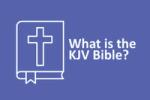
Featured
What is the King James Version (KJV) Bible?
Finding the right Bible isn’t easy. There are dozens of translations and hundreds of editions to choose from. Our new series of guides is here to answer your questions about the different Bibles on offer today.
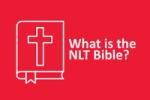
Featured
What is the New Living Translation (NLT) Bible?
Finding the right Bible isn’t easy. There are dozens of translations and hundreds of editions to choose from. Our new series of guides is here to answer your questions about the different Bibles on offer today.
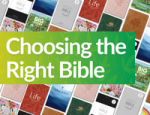
Bible
Choosing The Right Bible
With more than 20 English Language translations each available in 25 or more different editions the choice of Bibles excites and bewilders. Choosing the right Bible for you is important - even if you already have more than one.

Spiritual Growth
LENT COURSES - How to choose the right one for you
Long overshadowed by the celebrations of Easter Sunday, Lent is being rediscovered as a sacred time of reflection and renewal in its own right and a time of preparation for the joyous seasonal finale.
